
Six weeks into home confinement to curb the spread of the coronavirus, fewer people are texting to ask whether I have enough food. Conversations among fellow Shanghai residents also mention food supplies much less. Meanwhile, the government’s “Big Gift Boxes” arrive more frequently. My building’s group chat is still actively placing bulk delivery orders; now we’re buying not only rice, meat and other essentials but also indulgences: cakes, chocolates, even barbecue meat packages that come with electric grills.
For two years, when I heard about covid resurgences in other Chinese cities, I shrugged it off. The pandemic was part of life right now, I thought, and these things weren’t happening to me or anyone I knew. But as lockdown measures tighten, it’s harder and harder to dismiss the things I hear.
In recent weeks, a range of dire stories has circulated on social media — about people with severe illnesses unrelated to covid-19 who were unable to receive treatment at hospitals; metal barriers erected outside homes, sometimes creating “cages” that blocked streets; a fire threat made worse by lockdown barriers. It is hard to judge the veracity of these or other reports: tales of entire neighborhoods where people tested negative yet were still involuntarily moved to isolation hotels, sometimes in other cities; someone whose PCR test result had been false positive and fought to avoid being sent to a quarantine facility; a delivery driver who died after an accident because the ambulance arrived too late. Or the other kinds of horror stories, like those about the truckloads of fresh food sent from other provinces, as care packages, that allegedly were destroyed while people in some neighborhoods waited for supplies.
Many of us who have tested negative and had food stocked up read or heard these stories with the sympathy and anger that distance makes possible — reacting, while hoping that no such ill fate descends upon us. We keep group-ordering food and trying not to test positive.
Then came “Voices of April”, a poignant six-minute video compiling voices of the astonished, bewildered, anguished and sad residents who have struggled in this lockdown. The video was widely shared here, deleted by censors and then reposted more by ordinary men and women, as if so many people suddenly realized that we had a voice.
“People tried all their means to keep these posts alive for as long as we could”, one friend said. At 3 a.m., she was still reposting.
The next morning, however, the videos were gone, and we went back to being quiet.
In the quiet, I think about posts I see on WeChat, reports that since the first covid outbreak in early 2020, people in many small cities in China have been living in constant lockdowns: 160 days, 90 days, 60 days. Many of us ordinary Chinese had never heard such stories before.
Another disquieting report reached me a different way. A family in a relative’s compound who had been in close contact with people who tested positive were told last month that they would be taken to an isolation hotel. This family, with elderly members and young children, wished to isolate in their home. Compound residents turned out and physically blocked the gate to prevent their removal. “What’s happening to them today can happen to all of us tomorrow”, people said, according to my relative.
The next day, the family was taken away.
Buildings in my compound are now divided into two categories: ones with and without positive cases. People living in the former are supposed to test daily or every other day, while those in the latter test less frequently. In principle, residents in the less stringent category should be permitted to move more freely within and outside the compound. In practice, however, we remain locked inside.
So far, I haven’t seen anyone try to venture beyond the gate, which is still locked; our fear of breaking the rule, of becoming positive and being taken away, reins us in. The latest stories on social media say that in some neighborhoods, when one person tests positive all residents of that person’s building are being taken to isolation facilities and that people’s homes have been damaged in the extreme disinfection process that follows. All this adds to fears.
After more than a month in lockdown, I have grown so used to taking the antigen self-test — every morning, after I brush my teeth — that I can now take it without sneezing. I have grown used to not having options for meals. I have trained myself to order $60 worth of groceries within the 10 minutes an online shop is operating. I have even acquired some barber skills.
When options in life are limited, we learn to adapt. It doesn’t take that long to develop a habit or, it seems, a lifestyle. But what people can get used to is also alarming. This isn’t how life should be. Even more worrisome than adapting to confinement, we shouldn’t become accustomed to hearing horrifying stories all the time, or feeling a sense of shame for catching a virus, and fearing the social consequences of getting sick more than the disease itself.
One day, I hope, this lockdown will end, and perhaps with time many of us will forget all this ever happened. Things could return to how they used to be, when we thought things happened only to other people in other places. But even if we can go back, what will we do if it happens all over again?
Xing Zhao is a writer and translator living in Shanghai.
